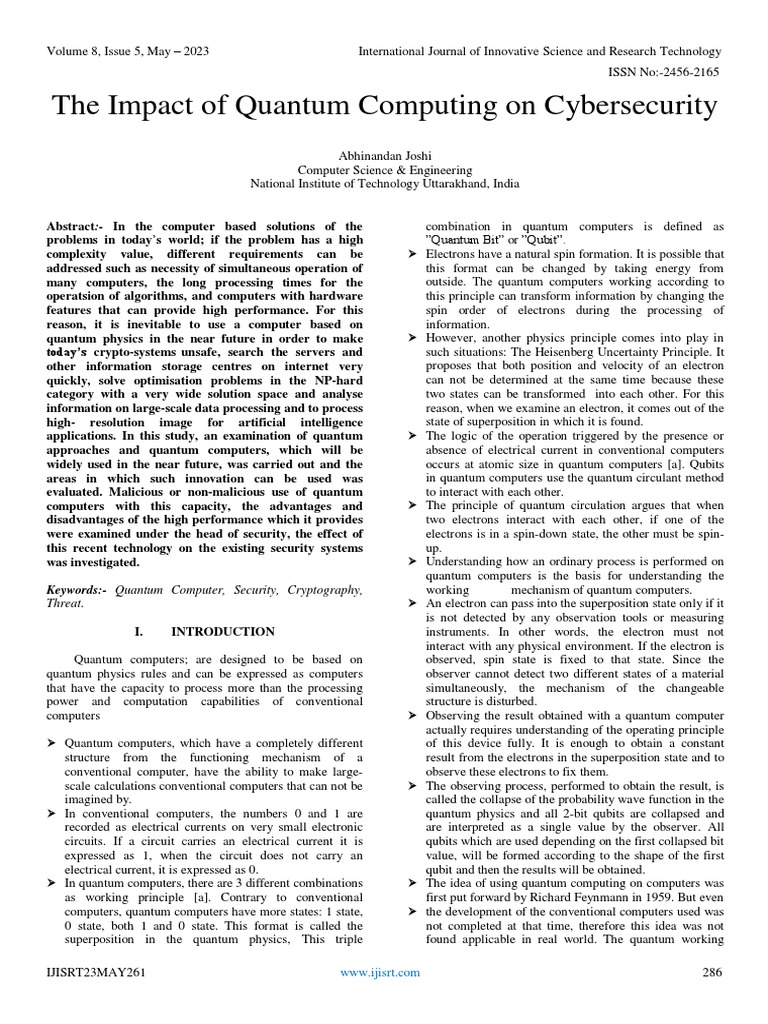The advent of quantum computing signifies a monumental leap in computational capabilities, transcending the limitations of classical computing paradigms. As this technology burgeons, its implications for information technology security become increasingly poignant. This article delves into the multifaceted ways in which quantum computing is poised to reshape cybersecurity frameworks, engendering both challenges and opportunities.
To comprehend the breadth of quantum computing’s impact on IT security, it is crucial to elucidate the underlying principles of quantum mechanics that empower this novel paradigm. Unlike classical bits, which embody a binary state of either 0 or 1, qubits can exist in superpositions of states. This characteristic permits quantum computers to process an inordinate amount of information simultaneously. Such capability catalyzes an unprecedented enhancement in computational speed, particularly for algorithms crucial to encryption schemes.
The cornerstone of contemporary cybersecurity lies in cryptography, predominantly hinging on algorithms such as RSA and ECC (Elliptic Curve Cryptography). These methodologies depend on the computational intractability of specific mathematical problems, like integer factorization and discrete logarithms, to devise secure communication channels. However, quantum algorithms, most notably Shor’s algorithm, undermine this foundation by presenting polynomial-time solutions to these computational conundrums. As quantum computers evolve, conventional encryption standards could potentially collapse under their efficacy, rendering a vast array of data and communications vulnerable to decryption by malicious actors equipped with quantum capabilities.
Consider a future scenario where an adversary harnesses quantum computing to compromise the integrity and confidentiality of sensitive information. It is not merely the specter of immediate data breaches that is disturbing; the ramifications extend to existential threats against the very frameworks that govern trusts in digital transactions. Trust, an elusive yet pivotal element, could diminish as entities grapple with this stark reality. The ensuing chaos could incite widespread panic, with organizations scrambling to fortify their defenses against a formidable adversary—quantum technology.
In juxtaposition to the aforementioned challenges emerges a burgeoning field of post-quantum cryptography. This domain seeks to develop new cryptographic systems that can endure quantum attacks, ensuring that sensitive information remains shielded from potential quantum decryption. Strategies encompass lattice-based cryptography, hash-based signatures, and multivariate polynomial cryptography, among others. These innovative solutions aspire to safeguard data integrity and confidentiality even amidst the onslaught of quantum capabilities, reinstating organizational confidence in cybersecurity measures.
Furthermore, quantum key distribution (QKD) represents another avenue where quantum mechanics intertwines with IT security. This approach capitalizes on the principles of quantum entanglement and the superposition of qubits to establish a communication channel whose security is fundamentally entrenched in quantum theory. By employing QKD, parties can detect eavesdropping attempts—in real time—because the act of measurement alters the quantum state of the system. While still in nascent stages of practical application, QKD holds promise for crafting impervious communication links that are inherently resistant to computational attacks.
As the landscape evolves, organizations must recalibrate their security strategies unilaterally. The looming threat of quantum computing necessitates a paradigm shift in IT security approaches, embracing both agile methodologies and robust infrastructures designed to withstand quantum threats. Proactive investment in research and implementation of quantum-resistant algorithms is imperative to preemptively mitigate the risks inherent in this new technological era.
Moreover, it is disconcerting to consider the implications of quantum computing beyond the realm of cryptography. The predictive prowess facilitated by quantum algorithms could be leveraged in nefarious ways to orchestrate advanced persistent threats (APTs). Armed with the ability to analyze vast datasets at startling speeds, malicious actors could refine their strategies and execute debilitating cyberattacks with pinpoint accuracy. This underscores the necessity for a multifaceted security framework that encompasses not merely defensive measures, but also anticipatory actions grounded in an acute understanding of emerging quantum capabilities.
The intersection of quantum computing and cybersecurity extends to the regulatory and ethical dimensions as well. As organizations endeavor to safeguard consumer data from quantum-enabled breaches, they must also navigate evolving compliance frameworks aimed at addressing the challenges posed by quantum advancements. The emergence of quantum encryption solutions may necessitate the re-evaluation of regulatory standards to ensure a commitment to safeguarding personal data in a rapidly transforming technological landscape. As such, collaboration among policymakers, researchers, and industry leaders is essential in constructing robust regulatory frameworks that adequately address the dual-edged sword of quantum computing.
In summation, the implications of quantum computing on IT security are profound and far-reaching. From the ascendance of quantum threats to the advent of post-quantum cryptography and quantum key distribution, organizations face a pivotal juncture in their cybersecurity strategies. It is essential to approach this transition with diligence, creativity, and foresight. Preparations for the quantum future must be undertaken with urgency, as the specter of its potentialities looms large, compelling a reexamination of established security paradigms. Embracing these technological advancements with prudence will determine the robustness of information security in a quantum era, ensuring that the digital realm remains an enclave of trust and safety amidst unprecedented challenges.












